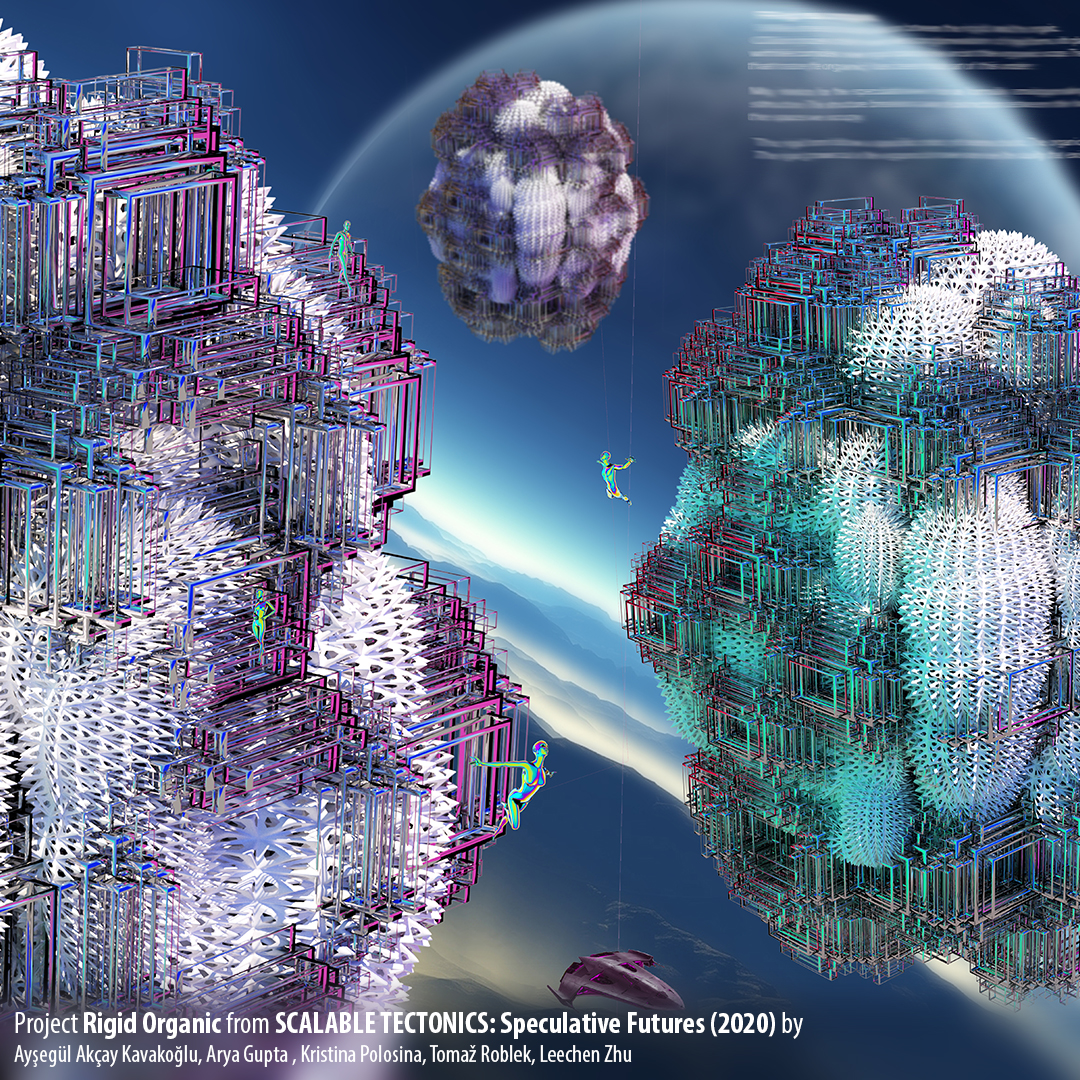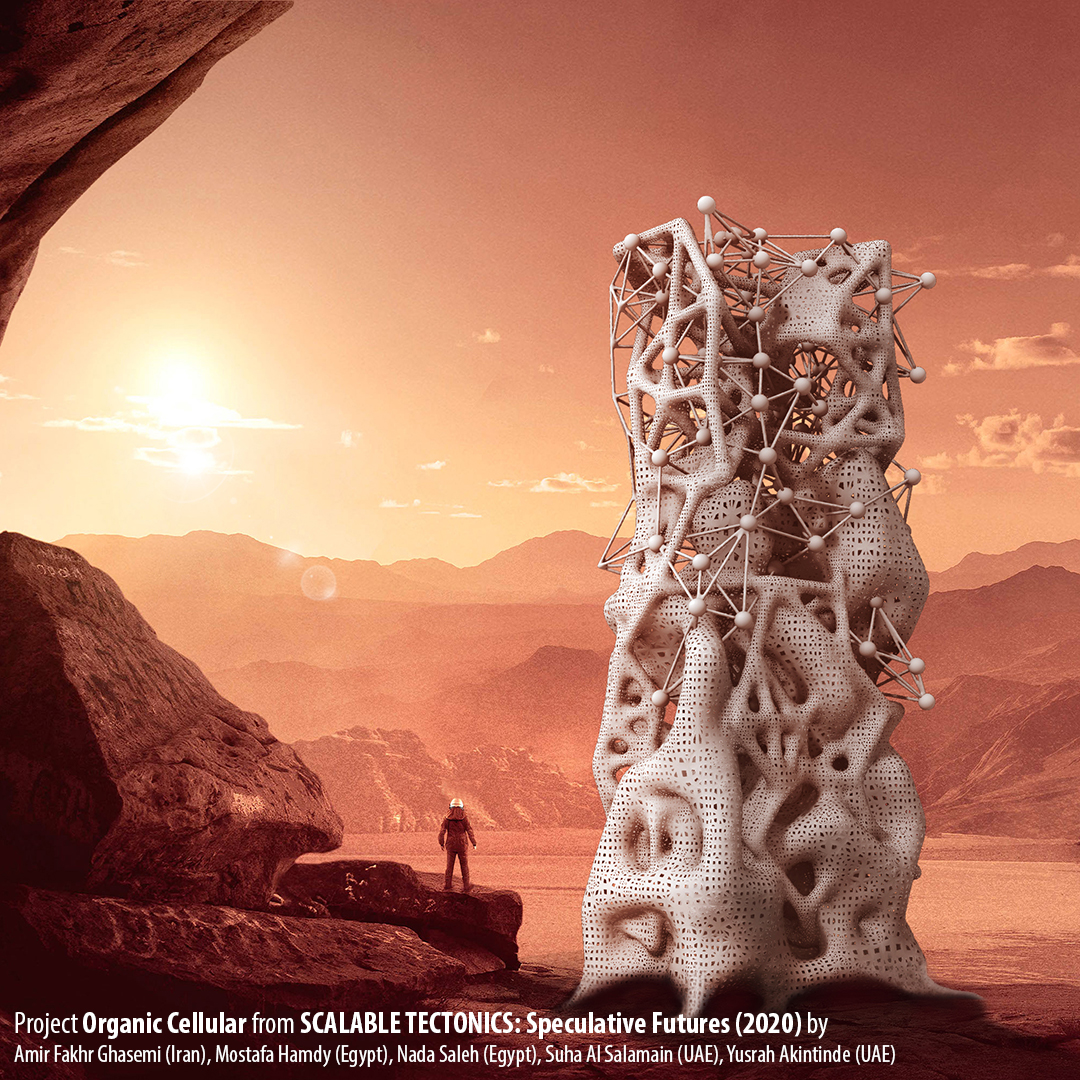Computational Design | Online Workshop | English | Europe-Mideast-Africa
Description:
The workshop would delve into creating scalable spatial systems of architectural relevance contextualized in a futuristic fictitious context where complex formations, data-driven algorithms and unprecedented geometries would be explored through computational design investigations. Participants would be taught intermediate and advanced aspects of visual scripting through Grasshopper3D & its extensions to create complex spatial tectonics that may potentially operate as various scales of a built form. Curated as a ‘comprehensive tutorial studio for Grasshopper3D’ through an interactive pedagogy of covering intermediate and advanced potentials of the tool, participants would learn about tool workflow, developing an algorithmic process and exploration of formal complexities using data-driven methodologies. NURBS & Mesh manipulations would form the underlying principles of spatial formations, investigated through a multitude of computational tools.
Initial focus would be to build on technical skill-set with tutorials, technical tool-kits (scripts) and assignments that would cover multiple aspects such as use of attractor points and curves to create data-driven forms on simple and complex geometries in Grasshopper. Concepts such as contouring, sectioning, paneling, surface tessellation along with some interesting form-development strategies through use of Kangaroo (Physics engine in GH), Weaverbird (Mesh Smoothening Algorithms), Anemone (Recursive Algorithms), Zebra (Agent-based simulation), 3D Field Formations (Native GH Components) would be demonstrated to test the formal complexities of the tool with examples and scripts. Technical tutorials would be fast paced & tool-kits would be provided for exploration. The focus would soon shift to applications of the complexities into spatial settings – architecture and urban for further visualization as an investigation of fictitious realities with various possibilities, allowing students to think, design & visualize their geometric experimentations in an unimagined context. Good visualization skills are recommended for all participants to ensure a good output.
Expected Outcome:
- A good grasp on using Grasshopper3D & applying it a design
- Explorations in the form of digital drawings, visualizations & diagrams.
- Visual documentation of spatial formations.


Key Words:
Computational Design,Grasshopper3D,Parametric,Futuristic
Required Skills:
Beginner Grasshopper, Intermediate Rhino, Strong Visualization Skills Recommended
Required Software:
Rhinoceros, Grasshopper (Grasshopper Plug-ins would be provided)
Required Hardware:
Standard Computer with min. 8 GB RAM. Webcam & Microphone for live interactions. Dual-screen preferred for real-time working.
Maximum number of participating students:
60
Initial focus would be to build on technical skill-set with tutorials, technical tool-kits (scripts) and assignments that would cover multiple aspects such as use of attractor points and curves to create data-driven forms on simple and complex geometries in Grasshopper. Concepts such as contouring, sectioning, paneling, surface tessellation along with some interesting form-development strategies through use of Kangaroo (Physics engine in GH), Weaverbird (Mesh Smoothening Algorithms), Anemone (Recursive Algorithms), Zebra (Agent-based simulation), 3D Field Formations (Native GH Components) would be demonstrated to test the formal complexities of the tool with examples and scripts. Technical tutorials would be fast paced & tool-kits would be provided for exploration. The focus would soon shift to applications of the complexities into spatial settings – architecture and urban for further visualization as an investigation of fictitious realities with various possibilities, allowing students to think, design & visualize their geometric experimentations in an unimagined context. Good visualization skills are recommended for all participants to ensure a good output.
Expected Outcome:
- A good grasp on using Grasshopper3D & applying it a design
- Explorations in the form of digital drawings, visualizations & diagrams.
- Visual documentation of spatial formations.


Schedule:
Jun 27 - Jul 2
-
Day 1 / Jun 27
-
Day 2 / Jun 28
-
Day 3 / Jun 29
-
Day 4 / Jun 30
-
Day 5 / Jul 2
Instructors:
-
 Sushant Verma rat[LAB] / SMART LABS,Founding Partner & DirectorSushant Jai-Amita Verma is a Design Entrepreneur, Architect, Computational Designer & Educator, currently leading rat[LAB] Studio (Research in Architecture and Technology) (www.rat-lab.org) that investigates intersections of design, art & technology through architecture, interior design and art installations. He holds a Masters Degree in Emergent Technologies & Design from Architectural Association, London and is a former architect at Zaha Hadid Architects, London & a Sr. Editor at Arch2O. He is the founder of rat[LAB]EDUCATION, which is an initiative to spread the idea of computation in design through independently-organized design workshops for profession and academia. Recipient of MAK Schindler Award from Vienna & Los Angeles and a finalist for AIA Emerging Leaders Fellowship from Chicago, his work is widely published and exhibited in London, Los Angeles, New York, Tokyo, San Francisco, Taipei, New Delhi, Mumbai among other places, internationally. Sushant has been a TEDx Speaker at 3 TEDxTalks in India and is the founding director of Smart Labs – India’s first 6 month hybrid programme on Computational Design that blends studio learning and e-learning using a technology-oriented approach, offered to students & professionals globally.
Sushant Verma rat[LAB] / SMART LABS,Founding Partner & DirectorSushant Jai-Amita Verma is a Design Entrepreneur, Architect, Computational Designer & Educator, currently leading rat[LAB] Studio (Research in Architecture and Technology) (www.rat-lab.org) that investigates intersections of design, art & technology through architecture, interior design and art installations. He holds a Masters Degree in Emergent Technologies & Design from Architectural Association, London and is a former architect at Zaha Hadid Architects, London & a Sr. Editor at Arch2O. He is the founder of rat[LAB]EDUCATION, which is an initiative to spread the idea of computation in design through independently-organized design workshops for profession and academia. Recipient of MAK Schindler Award from Vienna & Los Angeles and a finalist for AIA Emerging Leaders Fellowship from Chicago, his work is widely published and exhibited in London, Los Angeles, New York, Tokyo, San Francisco, Taipei, New Delhi, Mumbai among other places, internationally. Sushant has been a TEDx Speaker at 3 TEDxTalks in India and is the founding director of Smart Labs – India’s first 6 month hybrid programme on Computational Design that blends studio learning and e-learning using a technology-oriented approach, offered to students & professionals globally.